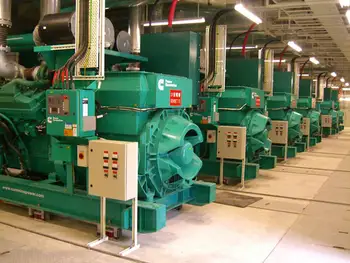How long do battery backups last?
By R.W. Hurst, Editor

Emergency Generators & Standby Power Systems
Our customized live online or in‑person group training can be delivered to your staff at your location.

- Live Online
- 12 hours Instructor-led
- Group Training Available
Download Our OSHA 4475 Fact Sheet – Being Aware of Arc Flash Hazards

- Identify root causes of arc flash incidents and contributing conditions
- Apply prevention strategies including LOTO, PPE, and testing protocols
- Understand OSHA requirements for training and equipment maintenance
Battery backups typically last between 3 and 10 years, depending on type, usage, and maintenance. UPS systems, backup batteries, and power storage units degrade over time due to temperature, charge cycles, and environmental factors affecting lifespan and reliability.
How long do battery backups last?
How long do battery backups last refers to the typical lifespan of uninterruptible power supply (UPS) and energy storage batteries used for emergency power reliability.
✅ Average life span ranges from 3 to 10 years
✅ Influenced by temperature, charge cycles, and maintenance
✅ Proper care extends UPS battery reliability and performance
Battery backup systems, pivotal for a continuous power supply, are integral in mitigating the impact of power outages in residential, commercial, and industrial environments. These systems, also known as uninterruptible power supplies (UPS), provide a critical safeguard against data loss and operational downtime. Understanding their lifespan, operational dynamics, and maintenance needs is vital for optimizing their functionality and longevity. Understanding battery backup lifespan begins with knowing how these systems store energy and provide continuous protection during power interruptions.
Understanding the Lifespan of Battery Backups
The expected lifespan of battery backup systems typically ranges from 3 to 15 years. This variation is largely due to the type of battery technology employed, with lithium-ion and lead-acid batteries being the most common. Lithium-ion batteries offer a longer service life, often exceeding a decade, due to their efficient charge cycle management and robust chemical stability. For organizations designing reliable systems, designing data center UPS infrastructure helps ensure that battery backup units are properly sized for efficiency and long-term performance.
For example, a well-maintained UPS operating in a temperature-controlled environment can last more than 10 years, while an overworked or overheated system in harsh conditions might fail in less than three.
Sign Up for Electricity Forum’s Generators/UPS Newsletter
Stay informed with our FREE Generators/UPS Newsletter — get the latest news, breakthrough technologies, and expert insights, delivered straight to your inbox.
Critical Factors Influencing Battery Life
-
Battery Type and Quality: High-quality lithium-ion batteries are renowned for their extended lifespan and stable performance.
-
Charge Cycle Management: Frequent deep discharges can shorten a battery's life, whereas managed charging cycles extend it.
-
Environmental Conditions: Batteries are sensitive to their environment; optimal conditions include stable, moderate temperatures and low humidity.
Strategies to Prolong Battery Backup Life
Implementing best practices in the installation and maintenance of battery backups can significantly enhance their lifespan:
Optimal Sizing and Configuration
Selecting a battery backup system that matches the power requirements of the connected devices ensures that the system is not overworked, promoting longevity and efficiency.
Advanced Charging Techniques
Smart charging technology, which adjusts the charging rate based on the battery’s condition and usage patterns, can prevent overcharging and extend battery life.
Regular Maintenance and Health Monitoring
Scheduled inspections and maintenance, including battery health checks and connection verifications, are essential for early detection of potential issues, preventing unexpected failures. To maintain compliance and performance, it’s important to follow tips for selecting a UPS system that matches your electrical load, backup duration, and maintenance requirements.
Environmental Optimization
Maintaining a controlled environment with proper ventilation and stable temperatures can mitigate the negative effects of extreme conditions on battery performance.
Technical Considerations
The technical specifications of battery backup systems, such as energy capacity, output power, and efficiency ratings, are crucial for assessing their compatibility with the intended load and operational demands. Understanding these specifications can aid in selecting a system that not only meets immediate power backup needs but also provides scalability and adaptability for future requirements. During extended outages, pairing a UPS with an emergency backup generator provides seamless power continuity and protects sensitive electrical equipment.
EF Partner Media
 Bushing Monitoring: What's the Difference Between Sum of Currents and Voltage Reference
Article
Bushing Monitoring: What's the Difference Between Sum of Currents and Voltage Reference
Article
 Hydrogen Detection System in UPS Battery Rooms
Brochure
Hydrogen Detection System in UPS Battery Rooms
Brochure
 Viper®-HV The World’s First High-Voltage Overhead Switchgear Solution
Product
Viper®-HV The World’s First High-Voltage Overhead Switchgear Solution
Product
 Line Guard: Prevents Crawling Animals from Reaching Overhead Assets
Line Guard: Prevents Crawling Animals from Reaching Overhead Assets
Battery backup systems are essential for ensuring an uninterrupted power supply and operational continuity in various settings. Their longevity depends on battery technology, usage patterns, and consistent maintenance practices. The efficiency and runtime of a battery backup depend not only on battery chemistry but also on high-efficiency UPS systems designed to minimize power loss and extend operational life. By applying smart charging methods, maintaining optimal environmental conditions, and ensuring proper system sizing, users can extend the useful life of their UPS systems and achieve reliable, long-term protection against power interruptions.
For broader insight into emergency power planning, visit our electrical generators and UPS channel, where you’ll find in-depth resources on generators, UPS ratings, and backup system reliability.
Related Articles




